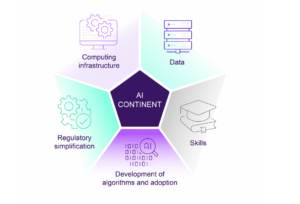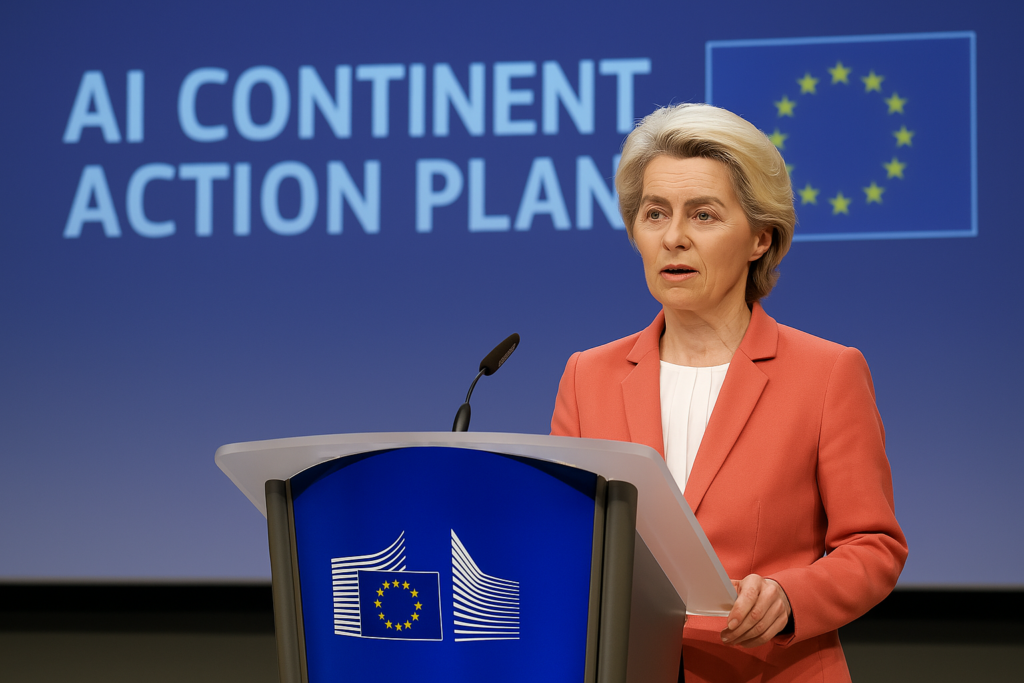On 9th April, 2025, the European Commission launched the AI Continent Action Plan, an ambitious initiative aimed at establishing the European Union as a global powerhouse in artificial intelligence. The plan, first introduced by President Ursula von der Leyen at the AI Action Summit in February 2025 in Paris, outlines bold strategies to transform Europe’s strong industrial base and deep talent pool into engines of innovation and AI excellence.
Five Pillars of the Action Plan
The plan sets out actions across five core areas: infrastructure, data access, adoption of AI, AI talent development, and regulatory simplification. Together, these pillars are intended to position Europe at the forefront of AI development, innovation, and deployment.

1. Supercomputing Powerhouses: AI Factories and Gigafactories
A key focus of the plan is the expansion of AI and supercomputing infrastructure across the continent. The Commission announced the establishment of a network of AI Factories, with 13 already being deployed around Europe’s supercomputers.
These AI Factories will serve as “open and dynamic AI ecosystems,” offering computing power, data access, and collaboration opportunities. According to the Commission, they will “support EU AI startups, industry and researchers in developing AI models and applications.”
Complementing this effort is the introduction of AI Gigafactories—large-scale facilities featuring approximately 100,000 state-of-the-art AI chips, “four times more than current AI factories.” These are designed to provide unprecedented computing power and are expected to be “the next wave of frontier AI models.”
The Commission is inviting expressions of interest from potential consortia and has launched InvestAI, an initiative to mobilise €20 billion in private investment for up to five AI Gigafactories.
2. Cloud and AI Development Act
To further support AI infrastructure, the Commission will propose a Cloud and AI Development Act, aiming to “at least triple the EU’s data centre capacity in the next five to seven years.” The Act will prioritise sustainable development of cloud infrastructure and offer incentives for investment in green data centres.
3. Improving Access to Data: Data Labs and Data Union Strategy
Recognising the centrality of data to AI, the Action Plan includes the launch of Data Labs. These labs will be based in the AI Factories and will “bring together and curate large, high-quality data volumes from different sources.” A Data Union Strategy, to be unveiled later in 2025, will underpin efforts to create a single internal market for data.
4. Apply AI Strategy to Drive Sectoral Adoption
Despite AI’s potential, only 13.5% of EU companies currently use AI, prompting the Commission to roll out a targeted Apply AI Strategy. The Strategy will focus on boosting the use of AI in strategic sectors like healthcare, manufacturing, climate, and finance.
“We need to accelerate its adoption to increase productivity and create new products and services,” said Executive Vice-President Virkkunen, emphasising the importance of AI in both the private and public sectors.
The Commission is launching multiple initiatives to meet the rising demand for skilled AI professionals. These include international recruitment efforts, the AI Skills Academy, and the MSCA Choose Europe programme to attract and retain researchers.
According to the Commission, Europe already has a strong starting point, with “30% more AI researchers than in the US.” The new programmes will aim to “train the next generation of AI specialists” and include AI-specific degrees, apprenticeships, and “returnship” schemes for women in AI.
The AI Skills Academy, opening a call for proposals on April 15, 2025, will provide training on AI and generative AI, targeting students and professionals alike.
5. Simplifying the Rules: Regulatory Guidance and AI Act Service Desk
The final pillar of the Action Plan aims to simplify regulatory frameworks and help companies comply with the AI Act, which entered into force in August 2024. A new AI Act Service Desk will be launched in July 2025, providing “a central point of contact and hub for information and guidance on the AI Act.”
Executive Vice-President Virkkunen emphasized that “around 85% of all AI systems remain unregulated” under the AI Act and that “for the remaining 15% we want to achieve a maximum of simplicity.”
To that end, the Commission is preparing guidance documents, self-assessment tools, and templates to assist businesses in complying with the new rules.
Stakeholder Engagement and Public Consultations
In parallel with the Action Plan, the Commission opened two public consultations running until June 4, 2025. These focus on the Cloud and AI Development Act and the Apply AI Strategy, inviting stakeholders to provide input on regulatory and practical challenges. A third consultation on the Data Union Strategy will launch in May.
Additionally, dialogues with industry and public sector stakeholders will take place to further refine the implementation of the plan and identify AI use opportunities.
AI Factory Tour Begins
To kickstart engagement, Executive Vice-President Virkkunen announced an AI Factory Tour, beginning with Luxprovide in Luxembourg this month, followed by Jupiter in Jülich, Germany, and Cineca in Bologna, Italy. “Time for action is now!” she declared during her remarks in Brussels.
What does this plan exude for Europe?
With the AI Continent Action Plan, the European Union is laying the foundation for a robust, inclusive, and sustainable AI ecosystem. By integrating infrastructure, data, talent, and regulatory frameworks, the EU is taking a decisive step toward becoming a “leading AI continent.” As the Commission emphasises, “AI is no longer ‘just’ a competitive advantage; it’s a necessity to be competitive and to close the innovation gap.”
REFERENCES

